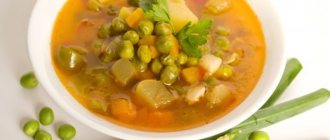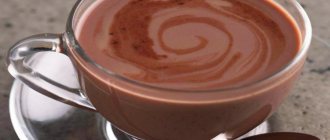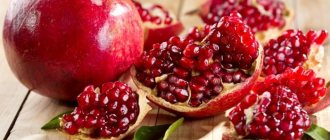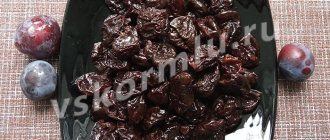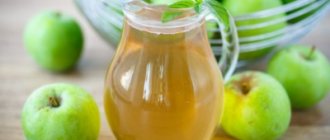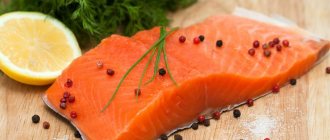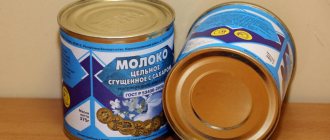A young mother needs a large amount of vitamins after giving birth. They can be obtained from various foods. There are especially many of them in vegetables and fruits and no less in juices. But during lactation, a fair question arises: is juice possible while breastfeeding? Considering that you need to drink a lot during lactation, this is very important.
When and what juices can you drink?
A nursing mother needs a large amount of vitamins. They can provide juices. But is it possible to drink juices from a nursing mother? Of course, immediately after giving birth it is better to refrain from using them. And juices should not be purchased, you need to make them yourself.
The most suitable ones are apple, birch, pumpkin, carrot, tomato, pomegranate, and peach. But you also need to be careful with them, since almost any juice and nectar can cause both positive and negative reactions.
When and in what quantity can a nursing mother drink juice?
Strong allergens, such as chocolate, strawberries or peanuts, are usually introduced into the diet of a nursing mother no earlier than six months of age. The same applies to orange juice - this time is the safest and with a high degree of probability such a drink will not lead to an allergic reaction.
If you wish, you can try introducing orange juice after the baby reaches three months of age, but not earlier, since until this moment the baby's digestive system is not yet so well developed.
It's best to start with a quarter glass. After drinking the juice, monitor your baby - if after 8 hours you do not observe a negative reaction in the form of redness or restless behavior, then most likely it will no longer occur. To be on the safe side, you can wait two days, after which you should double the volume of juice and monitor the child again.
You are allowed to drink no more than half to one glass per day. It is best to do this once a week, but if desired and the baby does not have an allergic reaction, you can increase the amount up to two times.
Birch juice
This drink is considered the most hypoallergenic of all others. It can only be obtained in early spring, when birch trunks are filled with sap and give it away freely. At the same time, it is well stored. It has no special taste and is not sweet. In addition, it has a beneficial effect on lactation, increasing milk volume.
It contains a large amount of potassium, calcium and magnesium. Moreover, the taste is neutral, it contains fructose and glucose, which are easily digestible and have a positive effect on brain activity. The drink helps perfectly during the period of spring vitamin deficiency, as it contains all the necessary vitamins - A, E, C, group B. It helps cleanse the blood of toxins, which is simply necessary in the state of modern ecology. This drink also helps improve the condition of the skin and hair.
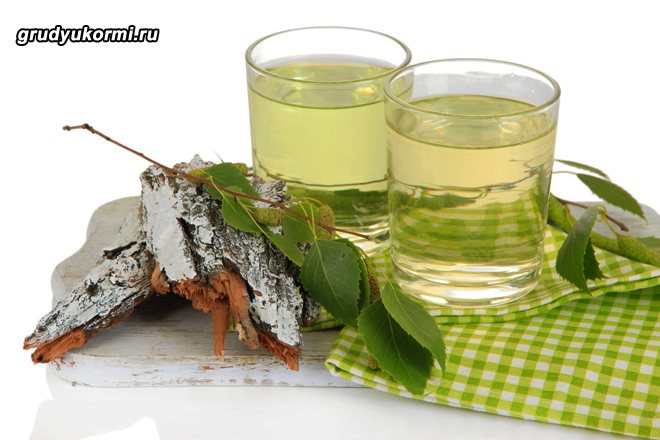
With all these wonderful qualities, there are contraindications. The main thing is individual intolerance. Although there is no allergic reaction to the juice itself, I have noticed an allergic reaction to the pollen. It is also contraindicated for people with kidney stones and stomach ulcers.
There is also a limitation in quantity - no more than 150-200 ml per day.
Benefits of drinking apple juice for women who are breastfeeding
At first glance, it may seem that there is no difference between apples and the juice squeezed out of them, and you can drink it immediately after the birth of the baby. Unfortunately, it is not. Fruit juice contains a huge concentration of substances that significantly exceed their content in one apple.
In the very first months of a newborn's life, the mother's nutrition is limited to make feeding the baby safe. For this purpose, some fruit juices begin to be drunk six months after childbirth. Of course, this does not mean that it is strictly forbidden to drink apple juice during lactation, but it is worth drinking this nectar in small quantities and at the same time watching how the baby reacts to it.
Now it’s worth identifying all the beneficial properties and effects of apple juice on the human body. Many pediatricians advise introducing this drink into your diet, as they consider it necessary to obtain the vitamins and substances contained in apple juice.
- Apple juice contains antioxidants. Their presence in the body prevents the development of elements that can excite cancer cells. Antioxidants also ensure faster recovery of cells damaged during childbirth. This is an important factor in the postpartum period.
- Apple juice contains a high concentration of vitamin C. Vitamin C has antioxidant properties and can strengthen the immune system in general. When taking juice in small quantities, the amount of vitamins in milk will significantly increase. These compounds will have a positive effect on the health and development of the baby.
- The huge amount of potassium contained in apple juice will also provide invaluable support for the body. Potassium removes excess fluid from the body. This is necessary in order to prevent the possibility of swelling. Also, the properties of this mineral will improve the functioning of the heart and blood vessels. The potassium content will normalize blood pressure and reduce the load on blood vessels and arteries.
- Apple juice will be a wonderful assistant in the fight against extra pounds. This is especially important for those women who experienced some metabolic disruptions after childbirth and gained a lot of weight. A glass of juice drunk at lunch will reduce the feeling of hunger in the future and give you a feeling of fullness.
- Substances found in apple juice accelerate the development of the baby’s brain activity and strengthen its nervous system. At the same time, the mother also shows improvements in the parameters of the brain and nerve cells.
- Women who have problems with constipation due to pregnancy and childbirth need to add fiber to their diet. It restores intestinal functions and frees it from waste and toxins.
- Malic acid and various enzymes contained in apple juice will help the stomach digest food.
- Apple juice will improve and speed up the removal of harmful enzymes from the body and, thanks to this, liver function will improve.
Is it possible to drink chicory while breastfeeding?
Apple juice
This drink is also nutritious and healthy. It is low in calories and contains easily digestible carbohydrates, fiber and vitamins (C, E, PP, P, B).
This is a storehouse of iron, which is necessary after childbirth and with low hemoglobin. The pectin contained in it removes toxins and waste from the body. Fruit acids prevent premature aging. It helps fight infections in diseases of the heart, liver, and kidneys. Improves digestion and stimulates intestinal function.
An allergic reaction to it is possible. Also, due to the large amount of acids, it can cause gastritis or stomach ulcers. But this is only possible in case of excessive use. The maximum you can drink while breastfeeding is 600-800 ml. It also does not have the best effect on the condition of the teeth. In this case, mix it well with water or juices (pumpkin, peach).
Why do doctors limit the consumption of juices while breastfeeding?
Every benefit becomes its opposite if you forget about moderation. Juices during breastfeeding, even those approved by a doctor, cannot be drunk without restrictions, despite the abundance of vitamins. There are reasons for this:
- An “overdose” of active substances in a child can cause a rash and itching on the skin, as well as excessively excite the nervous system;
- fiber, which is also present in the liquid, can cause increased gas formation and colic in the baby;
- Fruit juices contain a lot of sugar, which if consumed in excess by the mother is harmful to both her and the baby.
Pomegranate juice
Pomegranate drink is good for anemia. Also, the tannins contained in it strengthen. But this is sometimes a negative factor, since with constipation it will only worsen the situation. A large amount of potassium has a beneficial effect on the cardiovascular system. It improves the functioning of the digestive system, increases appetite, and has a positive effect on the immune system.
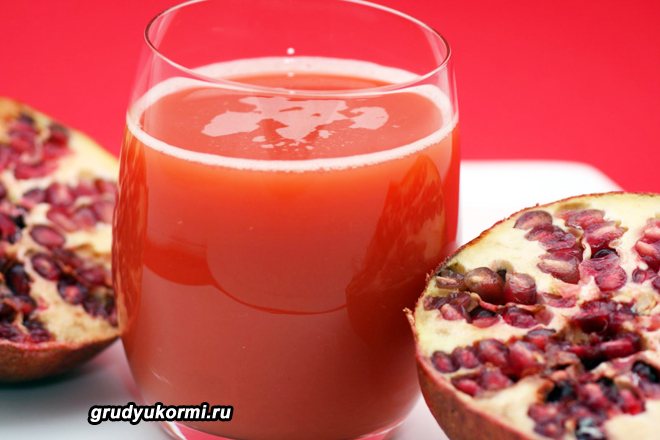
Like apple juice, pomegranate juice contains acids, which is also prohibited for diseases of the digestive system (pancreatitis, gastritis, etc.). Therefore, it must be diluted with other juices (beetroot, carrot) or simply with boiled water.
Drink no more than 100-300 ml. Although it is quite tart and hard to drink.
Which apple juice is best for a nursing mother?
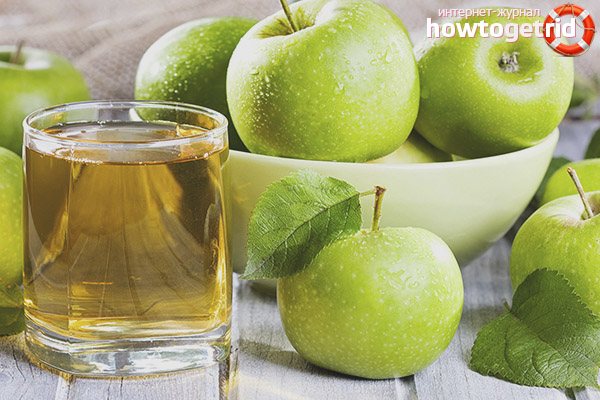
- When buying apple juice in supermarkets, it is worth looking at its composition. It should not contain anything other than natural juice. The presence of sugar and various impurities is unacceptable during breastfeeding.
- You should only buy in specialized departments and stores for nursing mothers. The products at these points of sale consist entirely of natural ingredients.
- You can add apple juice to your diet two months after giving birth, but you must dilute it with clean, boiled water. This concentration will significantly reduce the possibility of allergies.
- If you want to make your own apple juice, then use only green apples, as they are more suitable for a breastfeeding mother.
- When making your own, do not forget to cut out the core of the apples and their seeds. The peel must be left, because it contains the highest concentration of beneficial vitamins and substances.
- Remember to wash the apples thoroughly before juicing. There may be residue from chemicals used to keep insects away.
As you can see, apple juice is not so harmless, especially if consumed in unlimited quantities. Oversaturation of the body with substances contained in apple juice can lead to negative consequences. But by adhering to the advice given in this article, you can count on the fact that the juice will provoke only positive changes in your well-being, as well as in the development of your baby. The apple drink truly has the most important vitamins and properties. The main thing is to observe moderation and adhere to careful consumption in the presence of kidney and stomach diseases.
Is it possible to eat pears while breastfeeding?
pumpkin juice
In Russia this drink is not as widespread as in America. But in vain, since it is very nutritious and contains many vitamins and microelements. It is useful for diseases of the liver and nervous system. It is also good for preserving natural beauty. To improve your sleep and psychological state, you need to drink it before bed. It also improves immunity. It also has a beneficial effect for breastfeeding - it increases the amount of milk in the mother.
Pumpkin juice is unfavorable for low stomach acidity and other diseases of the digestive system. In addition, if you are prone to diarrhea, you should not drink it either. The norm is no more than 400-600 ml per day.
When is the best time to start drinking apple juice during breastfeeding?
Now let’s look at doctors’ recommendations about introducing apple juice into your diet. The most appropriate time to start taking the drink is three months after giving birth. By this time, the baby’s digestive system will become stronger and will be able to take in new substances and vitamins.
It is recommended to abstain from drinking three glasses of apple juice per week. You can drink them one every two days. Initially, drink a small amount of the drink and check the child’s reaction. If all is well, then you should continue drinking juice.
Without drinking a large amount of juice, mothers will provide themselves and their baby with the necessary amount of vitamins and substances necessary for full development, and will not harm the condition and health of the baby.
Is it possible to use pomegranate juice while breastfeeding?
Tomato juice
Whether tomato juice is allowed is a very controversial issue, since this product is quite difficult not only for the baby’s digestion, but also for the mother herself. But there are a lot of necessary substances - not only vitamins (A, E, PP, C, H, group B), also microelements:
- calcium;
- magnesium;
- potassium;
- iron;
- manganese;
- selenium and others.
Thanks to them, it has a good effect on the immune, cardiac, and nervous systems. The pigment contained lycopene has an antioxidant effect.
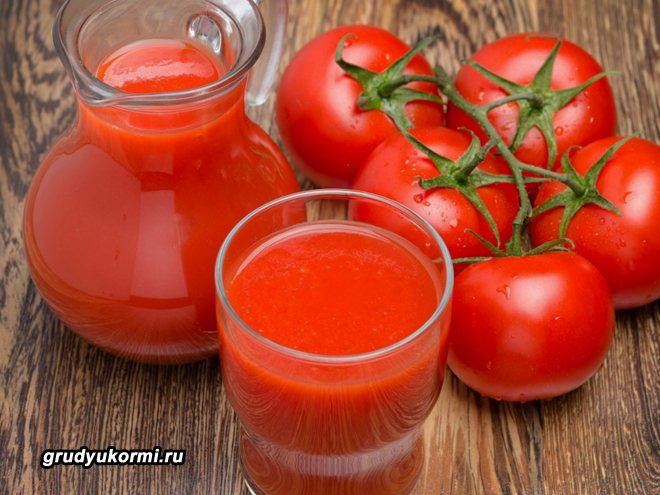
The negative factors are the same acute diseases of the gastrointestinal tract and a possible allergic reaction. You should not consume more than 200 ml per day.
carrot juice
Another vegetable drink is carrot. It is a source of vitamin A, which is essential for maintaining normal vision. It also strengthens bones and teeth, supports thyroid function, improves external condition, and has a cleansing and calming effect. It increases appetite.
Like other juices, it is undesirable for diseases of the gastrointestinal tract (gastrointestinal tract). If used excessively, it may stain the skin (mainly the palms and soles).
You should not drink more than a glass a day. Many people don’t like it, so it can be mixed with apple juice.
Peach juice
This drink is very thick due to the pulp it contains. But most often it is found in the form of nectars. It contains a large amount of organic acids, essential oils, vitamin C and group B. In addition, it is rich in carotene and pectin, improves digestion, removes toxins, improves liver function, and is good for those prone to colds and infectious diseases. Normalizes the functioning of the cardiovascular system.
It should not be used if you have diseases of the digestive system, allergies or a tendency to obesity. You need to drink no more than 150-200 ml.
How to drink juices during lactation
When it comes to whether juices can be used while breastfeeding, their benefits are also known for the fact that many of them increase the amount of milk. But it is best to move them to the first half of the day. Also, do not drink before meals.
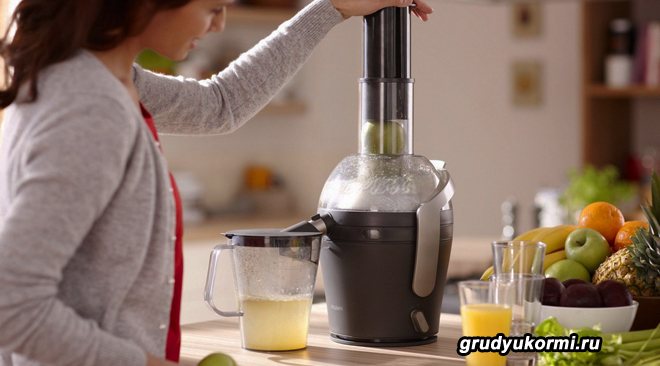
Drinks are introduced after 1-3 months of newborn baby. During this period, the baby's digestion is gradually established. You need to start with 1-2 sips. Then gradually increase to normal. But don’t forget about the rest of the drink. These are teas (including herbal), infusions, compotes and just pure water. Also, these drinks are not drunk in pure form, they must be diluted in a 1:1 ratio. This can be done with water or decoction.
| kinds | calories, kcal/100 g | useful material |
| birch | 24 | vitamins, fructose, organic acids, enzymes, tannins, potassium, magnesium, calcium, copper, sodium |
| apple | 42 | vitamins B, C, P, PP, E, iron, iodine, calcium, potassium, magnesium |
| pomegranate | 64 | vitamins (C, B), minerals, organic acids, enzymes, potassium, antioxidants |
| peach | 40 | organic acids, essential oils, fiber, iron, potassium, carotene, pectin, vitamins C, B |
| tomato | 21 | potassium, vitamins C, A, B, carotene, oxalic acid, purines |
| carrot | 28 | vitamins (A, E, C, D, B), potassium, calcium, magnesium, carotene, iodine |
| pumpkin | 38 | pectin, carotene, vitamins A, K, E, B, C, ascorbic acid |
What can a mother drink while breastfeeding?
The main drink for a nursing mother is clean water, weak tea and dried fruit decoctions. Fruit and vegetable juices are very useful, but they should be consumed in moderation and with caution. The baby's gastrointestinal tract is just adapting to the environment. The child may experience intestinal disorders due to new foods that the mother ate (drank). Each new product, including juice, should be included in the diet in small portions and the child’s reaction should be monitored. If everything is fine, you can continue to drink juice. If the newborn has a bloated tummy, a rash, sleeps poorly and is restless, it is better to exclude the new juice from the diet for several weeks. [2]
